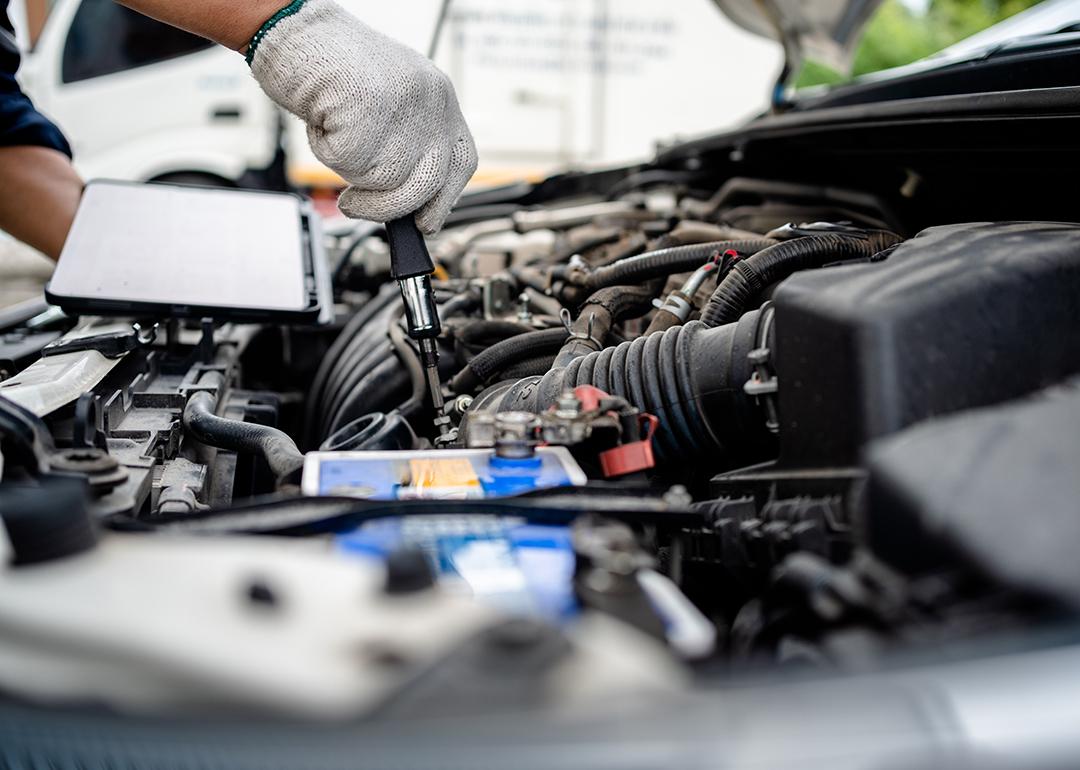
This story was produced by Edmunds and reviewed and distributed by Stacker Media.
Should you buy a prepaid car maintenance plan?
You've done your homework, read the reviews, and finally bought a car with a great reputation for reliability. It even comes with a strong warranty to offset the cost of unexpected repairs. Just before you sign the contract, the dealer offers you a prepaid maintenance plan. Anytime you need scheduled maintenance, you simply roll in, get it done and roll out without ever opening your wallet. Sounds tempting, right?
Prepaid maintenance plans typically cover scheduled services listed in the owner's manual—oil and filter changes, multi-point inspections, etc.—but exclude consumable items such as brake pads, rotors and windshield wipers. Edmunds says you'll still be on the hook for items that wear. Car maintenance packages can be worth the extra cost, but only if you can get a deal that's better than what you'd pay out-of-pocket for those parts and services. How do you know if you're getting a good deal? Unfortunately, that involves more homework.
Are prepaid plans a good deal?
"You can't figure this out face to face, on the spot," says Oren Weintraub, president of Authority Auto, a car-buying concierge company based in Los Angeles. "People get hit with so much information, and they're unprepared. They have no idea of the price of the product."
The finance manager offering the plan will likely present the prepaid maintenance plan in terms of a monthly payment, obscuring the costs of the overall plan.
"In general, any product that a dealer offers has value if the customer needs it and the price is right," Weintraub adds. But it's nearly impossible to know if the price is right as you sit in a dealership's finance and insurance office, signing lease or purchase paperwork. The only way to get clarity, then, is to do some cost research before you buy the car, when there's no pressure and you have time to compare out-of-pocket to the prepaid costs.
If you want a prepaid maintenance plan, try to get one offered by the carmaker, or a company approved or licensed by the automaker. Make sure it's portable. Getting a prepaid plan valid at only one dealership limits your flexibility, making it the only place you can go for service. Maintenance plans offered by automakers are typically honored at any of the brand's franchised new-car dealership service departments. A Mercedes-Benz prepaid maintenance plan is good at more than 380 dealers in the U.S., for example, and Mercedes claims it can save buyers up to 30%.
Prepaid maintenance plans can be customized for as long as you intend to have the vehicle. General Motors' brands (Buick, Cadillac, Chevrolet and GMC) offer plans with three-, five- and six-year terms. Note that a prepaid maintenance plan is not the same thing as an extended warranty. Dealers will usually offer you one of these as well. Read more about the pros and cons in the article 5 questions to ask before you buy an extended warranty.
Crunching the numbers
To determine if a prepaid maintenance plan makes sense, contact the dealer's service department and ask to speak to the service manager or a service adviser. Be persistent: Not all service managers will be available immediately, and some might not call you back. You might need to try a couple of different dealerships to get the information you need.
Ask for a list of all the required maintenance for the term you're interested in, along with the price of each service. Search for the owner's manual online—it will list all required services at the correct service intervals for your vehicle—to ensure you're getting an accurate quote, as opposed to extraneous services and items that the dealership might love to upsell.
Armed with out-of-pocket costs for oil changes, tire rotations and other typical prepaid plan services, you can negotiate a price for a prepaid plan. If you can't strike a deal that's less than what you'd pay out of pocket, it might not be worth it. A common pitch you may hear from the dealer is that prepaying locks in the costs at today's prices and is a hedge against inflation. That may be true, but typically only if you buy the plan outright. If you wrap it into the cost of your car's monthly payment, you'll be paying interest on the plan.
Weintraub says that, with the exception of just a few car brands whose plans don't offer good value (which he wouldn't name), he negotiates prepaid maintenance plans for his clients. "It's a no-brainer," he said.
A really good maintenance deal can be had if you're leasing, Weintraud adds. Audi and Mercedes-Benz, for example, incentivize the purchase of prepaid maintenance by increasing the residual value of the lease vehicle. Doing that reduces the upfront cost of the maintenance package.
Weintraub gave the example of a lease for an Audi Q5 with a residual value of 55%; the prepaid maintenance plan's retail cost is $869 for four years. If you were to fold the cost of the plan into your lease, Audi would raise the SUV's residual value by 1%, Weintraub said.
If the car's retail price was $50,000, that tweak adds $500 to its residual value, and the $869 maintenance plan would only cost you $369. Add tax and interest, and your cost for the plan is about $410, which buys you scheduled maintenance at 20,000, 30,000, 40,000 and 50,000 miles, plus brake fluid replacement every two years. Based on price quotes Weintraub got from two Southern California Audi dealerships, the out-of-pocket cost for those service visits comes to about $1,910. You would save $1,500 by prepaying.
If you were to buy the Q5 at the end of the lease, you would not realize the savings due to its higher residual value. But most people don't buy out their leases, Weintraub notes.
Should you buy a plan?
Buying a prepaid maintenance plan depends on whether you can negotiate a better-than-retail price on the included services. If the convenience of not paying as you go is important to you, a prepaid plan can be worth it. It might also give you peace of mind and perhaps even an incentive to stay on top of your car's maintenance. It requires a bit of legwork to determine if it's a good deal, but for many buyers, the ease and benefit of a prepaid plan will pay for itself.



